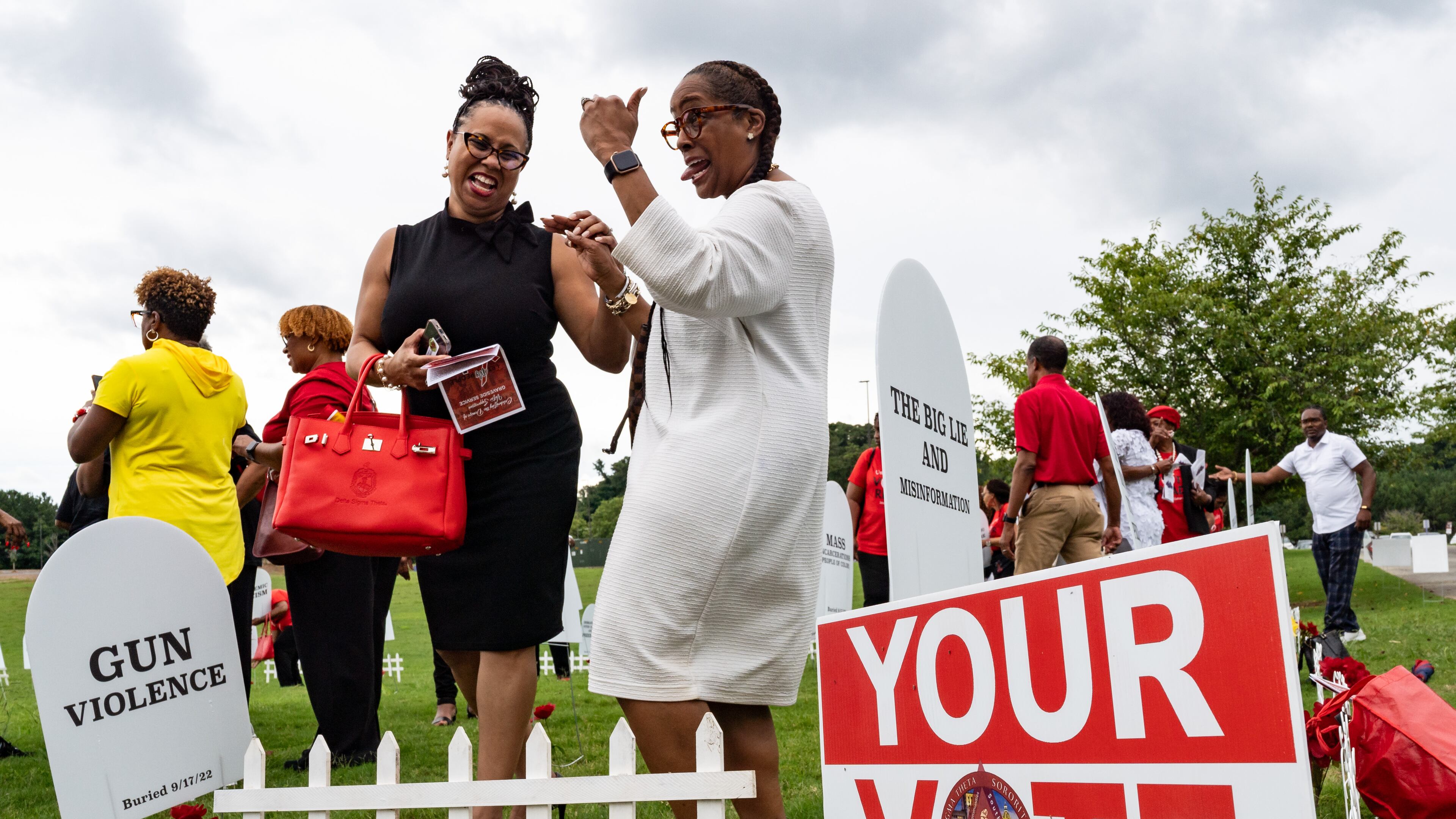Black churches are seeing the uncertainty of the Democratic Party dampen voter enthusiasm

The uncertainty surrounding whether President Joe Biden will continue his reelection bid to return to the White House has forced some difficult conversations within one of the party’s strongest bases: Black Americans.
The Democratic Party has long relied on the Black vote, whether local elections or for the nation’s highest office. And the Black church has played an integral role in getting voters energized and out to the polls.
With his admittedly poor performance in his debate with Former President Donald Trump, lackluster showing in the polls and questions about his health at age 81, many prominent Democrats and others have asked Biden to abandon his reelection bid. So far, Biden has maintained he will continue his run, although political speculation grew on Friday that he might announce his withdrawal this weekend.
Biden said he will return to the campaign trail next week after spending time isolated at home due to a COVID-19 infection.
Bishop Reginald T. Jackson is steadfast is in his support for a Biden/ Harris ticket. “I think the important thing is that people vote in their best interest and I don’t see where Donald Trump represents the best interest of African Americans, people of color or the nation.” He said he isn’t worried that Biden will step aside, but even if he does it doesn’t change things. “I don’t think it changes who we support or our need to support whomever is the nominee of the Democratic Party,” Jackson said.

Some Black clergy and congregants who spoke to The Atlanta Journal-Constitution said the uncertainty over whether Biden will stay in the race and a lack of enthusiasm from voters has hindered their efforts to mobilize voters.
“We don’t have anything to sink our teeth into,” said the Rev. Shanan Jones, president of Concerned Black Clergy of Metropolitan Atlanta, which has about 120 affiliated churches. “People are looking to us, (asking) is he going to get out of the race or not? It’s confusing. Black clergy are pulling together to create our own strategy to save democracy.”
He said there should be more clarity and better messaging from Democrats, although most African Americans still support the Biden and Harris ticket. And he believes they will favor Harris for the top spot if Biden does step away.
Whether Biden remains the Democratic nominee or not, the eventual nominee is likely to get most of the Black voters who still choose to vote.
Jason E. Shelton, director of the Center for African American Studies at the University of Texas at Arlington, said Black churches will always be seen as an anchor in the community and an advocate for voter education and mobilization.
Among church congregants, “the majority of African Americans are still going to vote Democrat,” he said. “What is different this time around is less about the church and more about the candidates. There’s something on both sides that’s unique about them. For Trump, many African Americans are adamantly opposed to his candidacy. But some affluent African Americans feel that they stand to benefit from his economic policies. As for Biden, most African Americans will support his candidacy. They remember his loyalty to former President Obama, so they will be loyal to him.”

Shelton said Black voters from religious traditions like Baptists, Methodists and Pentecostal are most likely to vote for Democratic presidential candidates.
“No less than 80% of their adherents vote Democratic,” said Shelton, author of the the soon-to-be-published book, “The Contemporary Black Church: The New Dynamics of African American Religion.”
But while the majority of Black voters lean Democrat, the Republican Party is becoming more attractive to some voters of color.
Recent polling for the AJC shows that under Trump, the Republican Party has cut into Democrats’ hold on voters of color. In June, only 69% of Black survey respondents said they planned to vote for Biden with another 18% undecided or planning to support a third-party candidate.
Compare that with 2020, where CNN exit polling indicated that 88% of Black voters in Georgia had supported Biden. The AJC polling shows Black voters in Georgia support Trump at nearly the same level in 2024 as 2020.
“I’m talking to pastors and all the pastors I’ve talked to are fully onboard with him (Biden),” said the Rev. Cynthia Hale, senior pastor of Ray of Hope Christian Church in Decatur, which has a weekly Sunday attendance of 500 people. “This is where we’ve been since the beginning.”
For her part, Hale said she will continue to be supportive of the party and Biden, but she’s worried about his health. Her church has had long standing voter outreach that has already begun and will continue through the election in November. “There are a lot of conversations taking place, especially targeting the young people on the whole idea of voting,” said Hale.
A big problem for Democrats, she said, is if Biden steps aside, and Vice President Kamala Harris does not rise to the top of the ticket.
Audraine Jackson, an Atlanta public relations executive and founder of the J&V Cares Foundation, has been a life-long member of Big Bethel AMC in Atlanta.
The church, she said, has a long history of encouraging its members to vote. Her mother was a voting rights advocate and a brother used to stand by the door before and after services, to hand out voter registration cards. The AMC denomination of more than 7,000 congregations nationwide has a long history of pushing self-determination and that includes voting.
“Every pastor at Big Bethel has advocated for voting,” she said. “They didn’t tell us how to vote, but they said we needed to vote.”
“I am true blue,” said Darlene Hudson, CEO of a nonprofit organization that works primarily with the Black LGBTQ+ community. ... “Whatever the Democrats have put in place that’s what I’m going with. It can be Biden/Kamala or Kamala/whomever.”
If Biden steps aside and Harris does not rise to the top of the ticket. Hudson said she may be disappointed but “I would understand, I think we have a lot of field work to do before we have a female president. I feel she’s capable but there’s still a lot of gender bias.”
Today, though, Black churches are facing more challenges, said Eric McDaniel, a professor in the government department and co-director of the Politics of Race and Ethnicity Lab at the University of Texas at Austin, including a decline in attendance that means churches are diverting some of the focus to keep their doors open. The decline is due in large part to the pandemic, when many services were livestreamed and in some cases congregants never came back inside the church, if at all.
A recent study by the Pew Research Center found that roughly 46% of Black Protestants said they attend religious services once a month, a drop of 15% from 2019.
“This will lead to a reduce role in community activities, such as voter mobilization,” he said.
He said there appears to be a lack of enthusiasm, which he said also happened in 2016.
However, he believes churches will pick up the pace, the closer it gets to November, but he worries that could be too late.
“If they want people to get out and vote, they need to start working on the unenthused or disconnected now, so that they are ready in November,” he said. “Also, a lot of this may hinge on the lack of effort on the part the of the parties. If the parties are actively mobilizing voters and clergy, we should expect the churches to follow. We should expect a flurry of mobilization after the party conventions.”


